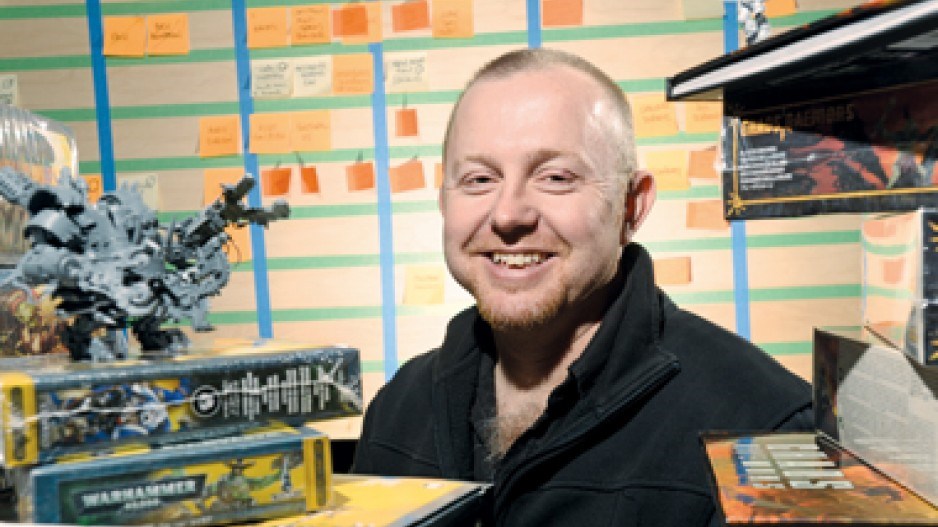Puzzles & Dragons is one of those smartphone games with manga-style characters that are ubiquitous in Japan.
It makes $2.5 million a day. Not a bad return for a free game made by six people.
The success of free games like Puzzles and Dragons and Angry Birds is part of a paradigm shift that has been drawing former console game developers into the casual game sphere.
Vancouver has lost some bigger game studios to Eastern Canada, and in recent weeks, Electronic Arts Inc. (Nasdaq:EA) closed two of its Vancouver studios – PopCap Games and Quicklime Studios, throwing dozens of game makers out of work.
But a number of smaller studios have been cropping up in their wake – most of them focused on the mobile and social media game space. Roadhouse Interactive and Slant Six Games are just two examples.
“What’s happening now is we’re seeing a lot of the 30-person studios,” said Richard Smith, director for Centre for Digital Media (CDM), which recently landed a new tenant – Japan’s Namco Bandai Games Inc.
“Vancouver’s independent studio backbone – which has evolved over the last couple of years as a result of some downsizing – is massive,” said Slant Six CFO Lance Davis, a director of DigiBC.
Slant Six did some downsizing of its own recently. The company has resorted to temporary layoffs, but plans to ramp back up when new projects start – a common occurrence in game development, which is project-based and somewhat cyclical.
Triple-A console games like Call of Duty and BioShock are still big money makers, but they also cost a lot to produce. BioShock Infinite is estimated to have cost $100 million. If they’re a hit, free-to-play games can also make big bucks, but cost a lot less to make.
“You don’t need a giant R&D department and 4,000 people to make a video game anymore, so that’s giving rise to smaller studios,” said James Hursthouse, CEO and co-founder of Roadhouse Interactive, a 60-person studio. “It might not compete with Halo, but it might compete with Angry Birds or something.”
Roadhouse recently picked up a licensing deal with UK-based Games Workshop to produce a tablet game based on the popular Warhammer 40,000 franchise.
According to some estimates, two billion mobile devices will ship by 2017, compared with console games in the tens of millions. Console game players, however, will pay up to $70 for a game, whereas most games made for mobile devices or Facebook are free or next to free.
The big challenge for free-to-play game developers is monetization through advertising and selling premium items to players, like power-ups and virtual currencies.
That is Hursthouse’s forte. He worked for Nexon Co. Ltd., the Tokyo-based game maker that is widely recognized as the company that invented the free-to-play model.
“How to make a game free but then monetize exceptionally well is a science,” Hursthouse said. “It’s not the easiest thing to do. It’s not the case that by simply being a great console developer you will get it right in the free-to-play arena from day one.”
Where console game developers excel is in creating a rich user experience, which is key to hooking players into buying premium game elements.
“That’s where the console and stand-alone PC guys come in – they’re very adept at game design,” Hursthouse said. “The winning formula is figuring out how to blend that with the free-to-play business model.”
And that’s one of the reasons smaller studios still need the big players, like EA: They create a centre of gravity that helps keep smaller satellites in orbit.
“They help to generate talent, interest in our industry and they bolster our profile,” Davis said. “There’s kind of a symbiotic relationship between the large studios and the indies.”
Despite EA shedding roughly 10% of its workforce worldwide, Dennis Chenard, the CDM’s director of industry relations, doesn’t take it as a sign the mothership is about to leave Vancouver.
Two new consoles are in the works – the PlayStation 4 and Xbox 720 – and Chenard said it is not unusual for such releases to be preceded by a slowdown in console game development.
“We’ve seen that gap every time a new console comes out,” he said. “They will see layoffs, but they’ll also pick up teams rapidly as new productions kick off.” •




